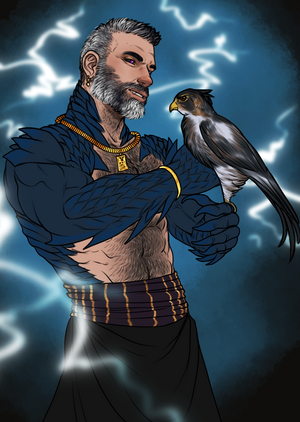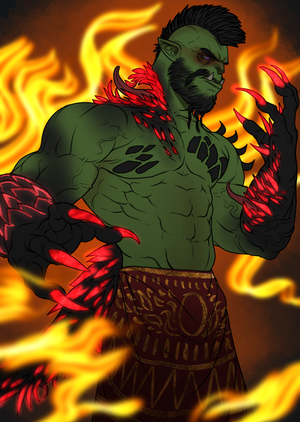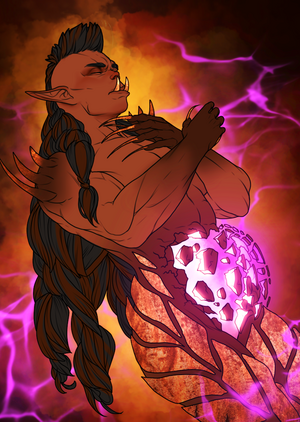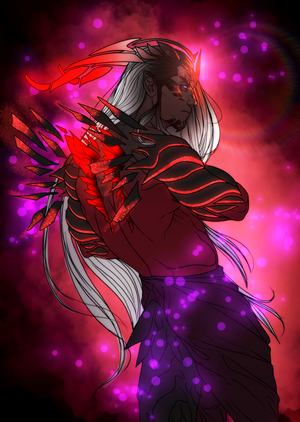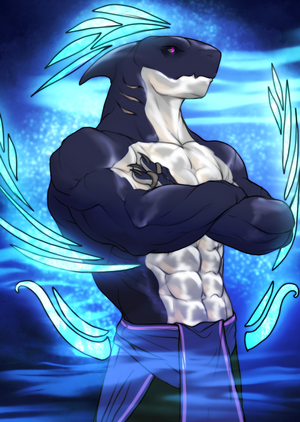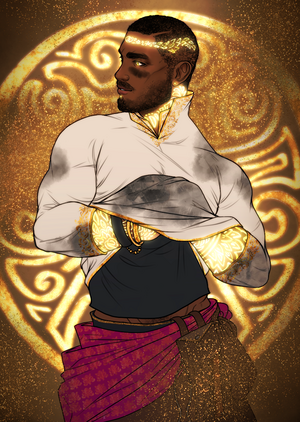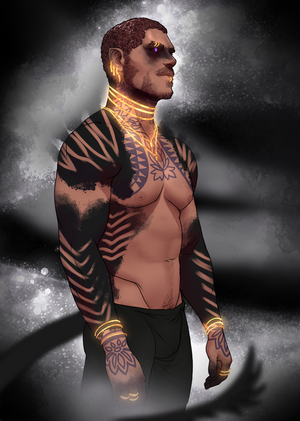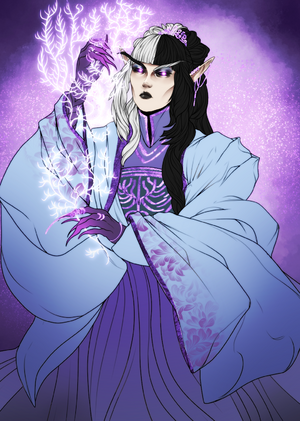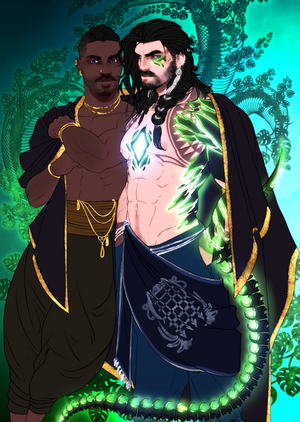Test1: Difference between revisions
No edit summary |
No edit summary |
||
| (20 intermediate revisions by 2 users not shown) | |||
| Line 1: | Line 1: | ||
{{Info religion | |||
|image = Gdwsgdse.png | |||
|pronunciation = Dra-konism | |||
|origins = Unknown, presumed over 70.000 years ago | |||
|deities = Regulus, Caius, Daiana, Triton, Nox, Marik, Severena, Aurora. | |||
|subsects = N/A | |||
|}} | |||
==Origins== | |||
===Divine Mechanics=== | |||
* | All Religions provide 1 single Mechanic to their Believers that fits within the flair of their Religion. This Mechanic is lost if the individual stops believing in the Religion, or becomes a heretic, but can be regained. Afflicted can use this mechanic, but having the mechanic does not imply that they have blanket forgiveness from their Gods, just that there is more nuance to it than that. | ||
* Draconism worshipers are able to use Persuasion Dice rolls on Gods both outside and inside of [[Divinium]] summonings which is normally not possible. Additionally they gain +2 to every Dice roll of Persuasion against a God, and their Persuasion Cap is raised by +2 when rolling against Gods. | |||
=== | ==Gods and Goddesses== | ||
===Regulus, the Blue King Dragon=== | |||
{| | {| | ||
|- | |- | ||
| rowspan="4" | [[File: | | rowspan="4" | [[File:Cedragoin.png|300px|caption|left]] | ||
| style="font-weight:bold; width:75px; vertical-align:top;" | Description | | style="font-weight:bold; width:75px; vertical-align:top;" | Description | ||
| style="vertical-align:top;" | | | style="vertical-align:top;" | | ||
|- | |- | ||
| style="font-weight:bold; width:75px; vertical-align:top;" | Virtues | | style="font-weight:bold; width:75px; vertical-align:top;" | Virtues | ||
| style="vertical-align:top;" | | | style="vertical-align:top;" | | ||
|- | |- | ||
| style="font-weight:bold; width:75px; vertical-align:top;" | Vices | | style="font-weight:bold; width:75px; vertical-align:top;" | Vices | ||
| style="vertical-align:top;" | | | style="vertical-align:top;" | | ||
|- | |- | ||
| style="font-weight:bold; width:75px; vertical-align:top;" | | | style="font-weight:bold; width:75px; vertical-align:top;" | Radical | ||
| style="vertical-align:top;" | | | style="vertical-align:top;" | | ||
|} | |} | ||
=== | ===Caius, the Red Dying Dragon=== | ||
{| | {| | ||
|- | |- | ||
| rowspan="4" | [[File: | | rowspan="4" | [[File:Caiuodragon.png|300px|caption|left]] | ||
| style="font-weight:bold; width:75px; vertical-align:top;" | Description | | style="font-weight:bold; width:75px; vertical-align:top;" | Description | ||
| style="vertical-align:top;" | | | style="vertical-align:top;" | | ||
|- | |- | ||
| style="font-weight:bold; width:75px; vertical-align:top;" | Virtues | | style="font-weight:bold; width:75px; vertical-align:top;" | Virtues | ||
| style="vertical-align:top;" | | | style="vertical-align:top;" | | ||
|- | |- | ||
| style="font-weight:bold; width:75px; vertical-align:top;" | Vices | | style="font-weight:bold; width:75px; vertical-align:top;" | Vices | ||
| style="vertical-align:top;" | | | style="vertical-align:top;" | | ||
|- | |- | ||
| style="font-weight:bold; width:75px; vertical-align:top;" | | | style="font-weight:bold; width:75px; vertical-align:top;" | Radical | ||
| style="vertical-align:top;" | | | style="vertical-align:top;" | | ||
|} | |} | ||
===Daiana, the Gray Dreaming Dragon=== | |||
{| | |||
|- | |||
| rowspan="4" | [[File:Dreamdragon.png|300px|caption|left]] | |||
| style="font-weight:bold; width:75px; vertical-align:top;" | Description | |||
| style="vertical-align:top;" | | |||
|- | |||
| style="font-weight:bold; width:75px; vertical-align:top;" | Virtues | |||
| style="vertical-align:top;" | | |||
|- | |||
| style="font-weight:bold; width:75px; vertical-align:top;" | Vices | |||
| style="vertical-align:top;" | | |||
|- | |||
| style="font-weight:bold; width:75px; vertical-align:top;" | Radical | |||
| style="vertical-align:top;" | | |||
|} | |||
===Triton, the Black Chain Dragon=== | |||
{| | |||
|- | |||
| rowspan="4" | [[File:Voiddragon.png|300px|caption|left]] | |||
| style="font-weight:bold; width:75px; vertical-align:top;" | Description | |||
| style="vertical-align:top;" | | |||
|- | |||
| style="font-weight:bold; width:75px; vertical-align:top;" | Virtues | |||
| style="vertical-align:top;" | | |||
|- | |||
| style="font-weight:bold; width:75px; vertical-align:top;" | Vices | |||
| style="vertical-align:top;" | | |||
|- | |||
| style="font-weight:bold; width:75px; vertical-align:top;" | Radical | |||
| style="vertical-align:top;" | | |||
|} | |||
===Nox, the Teal Unseen Dragon=== | |||
{| | |||
|- | |||
| rowspan="4" | [[File:Dueuaj.png|300px|caption|left]] | |||
| style="font-weight:bold; width:75px; vertical-align:top;" | Description | |||
| style="vertical-align:top;" | | |||
|- | |||
| style="font-weight:bold; width:75px; vertical-align:top;" | Virtues | |||
| style="vertical-align:top;" | | |||
|- | |||
| style="font-weight:bold; width:75px; vertical-align:top;" | Vices | |||
| style="vertical-align:top;" | | |||
|- | |||
| style="font-weight:bold; width:75px; vertical-align:top;" | Radical | |||
| style="vertical-align:top;" | | |||
|} | |||
===Marik, the Brown Etherforge Dragon=== | |||
{| | |||
|- | |||
| rowspan="4" | [[File:Yayh.png|300px|caption|left]] | |||
| style="font-weight:bold; width:75px; vertical-align:top;" | Description | |||
| style="vertical-align:top;" | | |||
|- | |||
| style="font-weight:bold; width:75px; vertical-align:top;" | Virtues | |||
| style="vertical-align:top;" | | |||
|- | |||
| style="font-weight:bold; width:75px; vertical-align:top;" | Vices | |||
| style="vertical-align:top;" | | |||
|- | |||
| style="font-weight:bold; width:75px; vertical-align:top;" | Radical | |||
| style="vertical-align:top;" | | |||
|} | |||
===Umbra, the White Twilight Dragon=== | |||
{| | |||
|- | |||
| rowspan="4" | [[File:Monkeydragongod.png|300px|caption|left]] | |||
| style="font-weight:bold; width:75px; vertical-align:top;" | Description | |||
| style="vertical-align:top;" | | |||
|- | |||
| style="font-weight:bold; width:75px; vertical-align:top;" | Virtues | |||
| style="vertical-align:top;" | | |||
|- | |||
| style="font-weight:bold; width:75px; vertical-align:top;" | Vices | |||
| style="vertical-align:top;" | | |||
|- | |||
| style="font-weight:bold; width:75px; vertical-align:top;" | Radical | |||
| style="vertical-align:top;" | | |||
|} | |||
===Felicula, the Yellow Harmony Dragon=== | |||
{| | |||
|- | |||
| rowspan="4" | [[File:Noimglong.png|300px|caption|left]] | |||
| style="font-weight:bold; width:75px; vertical-align:top;" | Description | |||
| style="vertical-align:top;" | | |||
|- | |||
| style="font-weight:bold; width:75px; vertical-align:top;" | Virtues | |||
| style="vertical-align:top;" | | |||
|- | |||
| style="font-weight:bold; width:75px; vertical-align:top;" | Vices | |||
| style="vertical-align:top;" | | |||
|- | |||
| style="font-weight:bold; width:75px; vertical-align:top;" | Radical | |||
| style="vertical-align:top;" | | |||
|} | |||
===Severena, the Green Stalwart Dragon=== | |||
{| | |||
|- | |||
| rowspan="4" | [[File:Noimglong.png|300px|caption|left]] | |||
| style="font-weight:bold; width:75px; vertical-align:top;" | Description | |||
| style="vertical-align:top;" | | |||
|- | |||
| style="font-weight:bold; width:75px; vertical-align:top;" | Virtues | |||
| style="vertical-align:top;" | | |||
|- | |||
| style="font-weight:bold; width:75px; vertical-align:top;" | Vices | |||
| style="vertical-align:top;" | | |||
|- | |||
| style="font-weight:bold; width:75px; vertical-align:top;" | Radical | |||
| style="vertical-align:top;" | | |||
|} | |||
===Aurora, the Purple Creation Dragon=== | |||
{| | |||
|- | |||
| rowspan="4" | [[File:Auroragoddess.png|300px|caption|left]] | |||
| style="font-weight:bold; width:75px; vertical-align:top;" | Description | |||
| style="vertical-align:top;" | | |||
|- | |||
| style="font-weight:bold; width:75px; vertical-align:top;" | Virtues | |||
| style="vertical-align:top;" | | |||
|- | |||
| style="font-weight:bold; width:75px; vertical-align:top;" | Vices | |||
| style="vertical-align:top;" | | |||
|- | |||
| style="font-weight:bold; width:75px; vertical-align:top;" | Radical | |||
| style="vertical-align:top;" | | |||
|} | |||
===Gaia, the Indigo Nature Dragon=== | |||
{| | |||
|- | |||
| rowspan="4" | [[File:New Canvadddsrtetgr.png|300px|caption|left]] | |||
| style="font-weight:bold; width:75px; vertical-align:top;" | Description | |||
| style="vertical-align:top;" | | |||
Gaia is not a Dragon exactly, but a mortal Aelrrigan Knight named Iorwerth (depicted right) who was an Archon serving the Dragons, carrying the soul of the dead Dragon Gaia. For centuries, Iorwerth was forced to serve the Malefica, one of the greatest unseen enemies of the Dragons, forced to conjure up vast magical structures, mazes, and fortresses for the Malefica and its Shades to use to deal death on mortals in the living world. He was forced to do this because his lover Cadell's (depicted left) soul had been captured by the Malefica, who used him as a bargain to string Iorwerth along. Through the intervention of mortals in Regalia, Iorwerth and Cadell were able to break free from the Malefica's control, and return to Aloria. There he rekindled with the Dragons he once served, but also still held the power of Ordial god-hood. For this, the Dragons tasked him to ascend to their pantheon by being the (somewhat reluctant) host of Gaia's Dragon Soulspark, a Dragon who had perished many centuries ago during the Denial of Immortality. While many of Iorwerth's structures still serve the Malefica, all have become overgrown with lush vines and the Lillies of the Valley, Iorwerth and Cadell's favorite flower. In this, Gaia's powers manifest as the Dragon of Nature, the other half of Aurora's Craters of Creation. While she created the living beings that inhabited nature, it was Gaia who created the plants and trees and flowers that decorate all the realms. Thus, carrying life and death in his body and his love by his side, Iorwerth is the Draconic God of Nature, tranquility, absolution, and redemption in rebirth. | |||
|- | |||
| style="font-weight:bold; width:75px; vertical-align:top;" | Virtues | |||
| style="vertical-align:top;" | | |||
Virtue to Gaia (This God is both called Gaia and Iorwerth) is preserving balance of nature, in the give and take between the forces within an ecosystem, and preventing cascade collapse due to dying flora. From the smallest of maggots, to the largest of mammals, nature exists as the bedrock of life on Aloria. Iorwerth specifically adds to this, by making the act of redemption both in receiving and offering others the chance, a true virtue and to never give up in the face of even the most malicious of death-bound forces to return to a righted world and make amends. | |||
|- | |||
| style="font-weight:bold; width:75px; vertical-align:top;" | Vices | |||
| style="vertical-align:top;" | | |||
Vices to Gaia, are the stupidity and naivety to outsmart forces greater in power than the self. In this, Iorwerth and Cadell's centuries-long imprisonment in the Beyond acts as a deterrent and a warning that evil forces are not interested in playing fair or honest, and that respecting duels or challenges of powerful entities is foolish. Iorwerth and Cadell express above all that it is a Vice to not seek help, to not ask for saving, and to foolhardy insist that the individual can overcome all trials and struggles alone. Gaia looks down on lone wolves who risk others with their own recklessness. | |||
|- | |||
| style="font-weight:bold; width:75px; vertical-align:top;" | Radical | |||
| style="vertical-align:top;" | | |||
Gaia's Radical is the Radical of Integration. This Radical proposes that the Occult can have the right to exist in the mortal world, but only insofar they are able to exist in a social ego system that is in harmony with their environment and the people around them. This vague concept proclaims that the Occult have a right to exist, but that to claim this right they must adapt and conform, concede, and compromise, and cannot hold onto selfish notions of complete autonomy. Failing this, Gaia's Radical proposes purging invasive Occult who disrupt social eco systems to preserve stability. | |||
|} | |||
==Priesthood== | |||
==Morality of the Faith== | |||
==Expanded Lore== | |||
The Expanded Lore section contains additional contextual information about the Draconist faith. | |||
*[[Draconism Expanded]] | |||
==Trivia== | |||
To be Expanded. | |||
{{Religion}} | |||
{{Accreditation | |||
|Artists = | |||
|Writers = MonMarty | |||
|Processors = FireFan96 | |||
}} | |||
[[category:Religion]] | |||
Revision as of 20:34, 22 May 2024
| Test1 | |
|---|---|
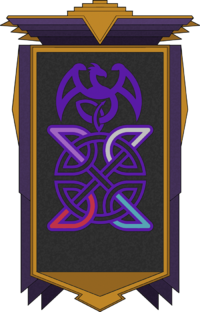 | |
| Religion | |
| Pronunciation | Dra-konism |
| Origins | Unknown, presumed over 70.000 years ago |
| Deities | |
| Regulus, Caius, Daiana, Triton, Nox, Marik, Severena, Aurora. | |
| Subsects | |
| N/A | |
Origins
Divine Mechanics
All Religions provide 1 single Mechanic to their Believers that fits within the flair of their Religion. This Mechanic is lost if the individual stops believing in the Religion, or becomes a heretic, but can be regained. Afflicted can use this mechanic, but having the mechanic does not imply that they have blanket forgiveness from their Gods, just that there is more nuance to it than that.
- Draconism worshipers are able to use Persuasion Dice rolls on Gods both outside and inside of Divinium summonings which is normally not possible. Additionally they gain +2 to every Dice roll of Persuasion against a God, and their Persuasion Cap is raised by +2 when rolling against Gods.
Gods and Goddesses
Regulus, the Blue King Dragon
| Description | ||
| Virtues | ||
| Vices | ||
| Radical |
Caius, the Red Dying Dragon
| Description | ||
| Virtues | ||
| Vices | ||
| Radical |
Daiana, the Gray Dreaming Dragon
| Description | ||
| Virtues | ||
| Vices | ||
| Radical |
Triton, the Black Chain Dragon
| Description | ||
| Virtues | ||
| Vices | ||
| Radical |
Nox, the Teal Unseen Dragon
| Description | ||
| Virtues | ||
| Vices | ||
| Radical |
Marik, the Brown Etherforge Dragon
| Description | ||
| Virtues | ||
| Vices | ||
| Radical |
Umbra, the White Twilight Dragon
| Description | ||
| Virtues | ||
| Vices | ||
| Radical |
Felicula, the Yellow Harmony Dragon
| Description | ||
| Virtues | ||
| Vices | ||
| Radical |
Severena, the Green Stalwart Dragon
| Description | ||
| Virtues | ||
| Vices | ||
| Radical |
Aurora, the Purple Creation Dragon
| Description | ||
| Virtues | ||
| Vices | ||
| Radical |
Gaia, the Indigo Nature Dragon
| Description |
Gaia is not a Dragon exactly, but a mortal Aelrrigan Knight named Iorwerth (depicted right) who was an Archon serving the Dragons, carrying the soul of the dead Dragon Gaia. For centuries, Iorwerth was forced to serve the Malefica, one of the greatest unseen enemies of the Dragons, forced to conjure up vast magical structures, mazes, and fortresses for the Malefica and its Shades to use to deal death on mortals in the living world. He was forced to do this because his lover Cadell's (depicted left) soul had been captured by the Malefica, who used him as a bargain to string Iorwerth along. Through the intervention of mortals in Regalia, Iorwerth and Cadell were able to break free from the Malefica's control, and return to Aloria. There he rekindled with the Dragons he once served, but also still held the power of Ordial god-hood. For this, the Dragons tasked him to ascend to their pantheon by being the (somewhat reluctant) host of Gaia's Dragon Soulspark, a Dragon who had perished many centuries ago during the Denial of Immortality. While many of Iorwerth's structures still serve the Malefica, all have become overgrown with lush vines and the Lillies of the Valley, Iorwerth and Cadell's favorite flower. In this, Gaia's powers manifest as the Dragon of Nature, the other half of Aurora's Craters of Creation. While she created the living beings that inhabited nature, it was Gaia who created the plants and trees and flowers that decorate all the realms. Thus, carrying life and death in his body and his love by his side, Iorwerth is the Draconic God of Nature, tranquility, absolution, and redemption in rebirth. | |
| Virtues |
Virtue to Gaia (This God is both called Gaia and Iorwerth) is preserving balance of nature, in the give and take between the forces within an ecosystem, and preventing cascade collapse due to dying flora. From the smallest of maggots, to the largest of mammals, nature exists as the bedrock of life on Aloria. Iorwerth specifically adds to this, by making the act of redemption both in receiving and offering others the chance, a true virtue and to never give up in the face of even the most malicious of death-bound forces to return to a righted world and make amends. | |
| Vices |
Vices to Gaia, are the stupidity and naivety to outsmart forces greater in power than the self. In this, Iorwerth and Cadell's centuries-long imprisonment in the Beyond acts as a deterrent and a warning that evil forces are not interested in playing fair or honest, and that respecting duels or challenges of powerful entities is foolish. Iorwerth and Cadell express above all that it is a Vice to not seek help, to not ask for saving, and to foolhardy insist that the individual can overcome all trials and struggles alone. Gaia looks down on lone wolves who risk others with their own recklessness. | |
| Radical |
Gaia's Radical is the Radical of Integration. This Radical proposes that the Occult can have the right to exist in the mortal world, but only insofar they are able to exist in a social ego system that is in harmony with their environment and the people around them. This vague concept proclaims that the Occult have a right to exist, but that to claim this right they must adapt and conform, concede, and compromise, and cannot hold onto selfish notions of complete autonomy. Failing this, Gaia's Radical proposes purging invasive Occult who disrupt social eco systems to preserve stability. |
Priesthood
Morality of the Faith
Expanded Lore
The Expanded Lore section contains additional contextual information about the Draconist faith.
Trivia
To be Expanded.
| ||||||||||
| Accreditation | |||||||
|---|---|---|---|---|---|---|---|
|
| ||||||
